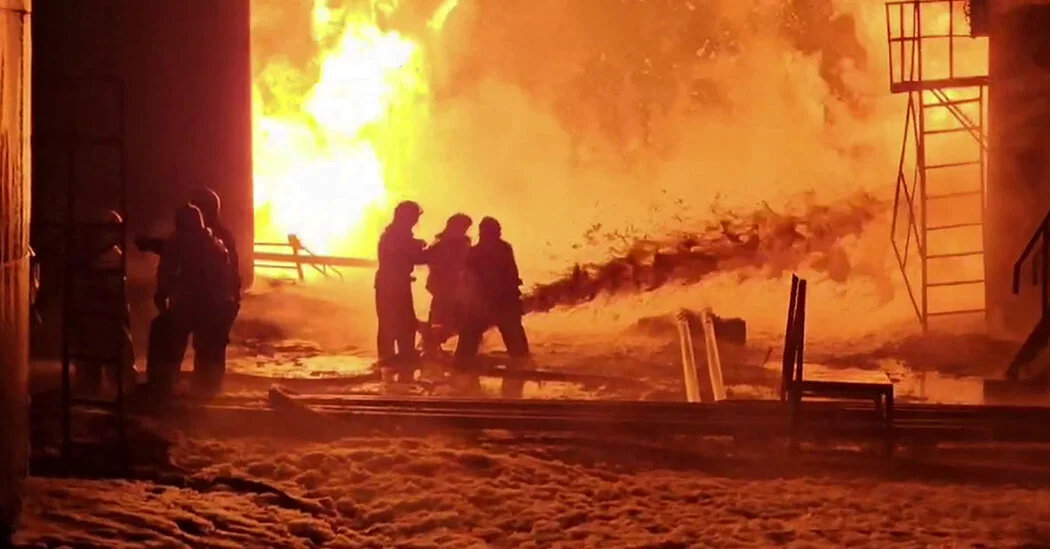Mr. Ernst and Mr. Krutikhin noted that, unlike in other oil infrastructure such as pipelines, a lot of complex machinery and sophisticated engineering goes into refineries, and they can take several months to fix. Some analysts say the repairs could take longer than usual because sanctions prohibit Western sales of certain components to Russia.
Should have done it from the beginning
Or at least the beginning of winter
This is the best summary I could come up with:
With its army short of ammunition and troops to break the deadlock on the battlefield, Ukraine has increasingly taken the fight behind Russian lines, attacking warships, railways and airfields in an attempt to diminish Moscow’s military operations.
On Tuesday and Wednesday, Ukrainian drones hit four Russian refineries, officials on both sides said, adding to a series of recent attacks that have set fire to depots, fuel tanks and other oil infrastructure across Russia.
Mikhail Krutikhin, an independent Russian energy analyst living in exile in Oslo, said the strikes had prompted Moscow to introduce a six-month ban on gasoline exports, starting March 1, to try to ensure that domestic demand is met while repairs are made to damaged refineries.
Oil plants are sprawling and hard to protect, and there are so many of them across Russia that Moscow cannot realistically provide them all with air defenses, according to Mr. Krutikhin and Damien Ernst, an energy expert and professor at the University of Liège in Belgium.
After this week’s attacks, the Russian authorities said operations had been temporarily halted at two of the refineries that were hit near Nizhny Novgorod, east of Moscow, and in the southern Rostov region.
After Moscow invaded Ukraine in February 2022, Western nations introduced sweeping sanctions targeting Russian sales of hydrocarbons — including oil, gas and coal.
The original article contains 898 words, the summary contains 220 words. Saved 76%. I’m a bot and I’m open source!
Ukraine is still bleeding more than Russia. Instead of gloating over human waves they should have used the moment when the Russian military was obviously incompetent and inexperienced. Now the gap in expertise is smaller.
Time for the comeback? 😱
But when Russia attacked Ukraine’s nuclear reactor, we were told that was bad.
Edit: one person’s terrorism is another person’s fight for freedom.
Oil isn’t highly radioactive you twat.
Never mind the huge difference in impact from oil infrastructure and nuclear, context matters. Who the aggressor is makes a big difference.
Key difference: a major failure at the nuclear reactor is can kill people across a large area.
Taking out refineries is going to raise the cost of gas, and lower the value of oil, resulting in both a cut to drilling and to burning, which is a net benefit for people.
Key difference: a major failure at the nuclear reactor is can kill people across a large area.
That area being large enough to encompass others. Not just the belligerents.
Please explain how burning a refinery reduces burning?
Prevent crude oil from being refined, and it’s not useful, so people don’t burn it. The quantities passed through the refinery are far greater than the amount present at it on any given day, so one less refinery means a whole lot less consumption.
Oh so what you’re saying is that the US burning Iraqi oil fields in the Gulf war(s) was for environmental reasons.
That’s really progressive.
Burning an oil well directly burns oil which people would otherwise burned, while raising prices and encouraging additional extraction. I’ll also note that Saddam Hussein had people light the oil wells on fire before the US moved in.
An attack on a refinery prevents oil from being burned, and can’t burn oil that’s not there. I’d prefer to see them shut down in a planned matter, but this is better than keeping them going.
Different things are different. Deal with it.
Burning oil to prevent people from burning fossil fuels is certainly a take.
Carbon is carbon. Burning crude oil puts carbon in the air just like burning petroleum does. The difference is now you’ve driven energy costs up while wasting the resource.
Edited to add: so if Saddam burning oil fields in Kuwait was bad, are we also going to admit that Ukraine burning oil refineries in Russia is also bad? Or is it only bad when our enemies do it?
An attack on the midstream is fundamentally different from burning oil at the well in terms of how it affects how much carbon goes into the atmosphere; it results in oil not being extracted and burned.
Give me your house. If you refuse and fight back you’re a terrorist…
But did you condemn Hamas?
Butwhatabout… Appeal to hypocrisy
Gonna JAQ people off next?
Have you condemned Azov like the Russians want you to?



